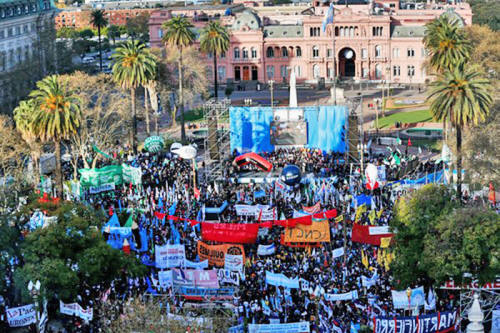|
September 15, 2016
A rally against government job cuts, the elimination of subsidies and other policies of Argentina's president, Mauricio Macri, Buenos Aires, Sept. 2, 2016 (AP photo by Agustin Marcarian).
Over the past few decades, Latin America became the very public incubator of new economic models - or at least of flamboyant variations on old ones.
For a while, it seemed as if the region
might just give birth to some kind of a successful hybrid: a
populist, leftist formula for expanding economies and erasing
poverty, powered by the free market and assertively steered by
governments.
Even Brazil's milder form of
redistributive leftist capitalism has driven itself into a wall,
smashed up like a drunk driver by the intoxicating power of
corruption.
With Macri beaming by his side, Obama declared,
Six months later, and with political and
economic turmoil even more pervasive, the question of which, if any
Latin American country can set a new path for the continent remains
an open one.
Of the three, it is Macri's Argentina
that still offers the greatest potential to establish itself as an
object of emulation.
When the visit was announced, people wondered how it could possibly be a good idea for Pena Nieto.
The skeptics were quickly proved right, and Peña Nieto's approval ratings, already plumbing depths never seen by any other Mexican president, took an even deeper dive. The puzzling decision to invite Trump, who has insulted Mexican immigrants to the U.S., left the already unpopular Peña Nieto with a black eye that won't heal anytime soon.
With the president's standing at home
and in the region battered and the economy barely growing, the only
Latin American country that is geographically located in North
America stands no chance of becoming an inspiration to its southern
neighbors any time soon.
Under former President Luis Inacio Lula da Silva, the government attacked poverty with the urgency it deserves, but did so without alienating the business sector or hollowing out the functioning of free markets.
It looked like at last it would shed its ironic motto:
If there is one lesson for Latin Americafrom the recent search for economic salvation,it is to look beyond charismatic individualsand easy solutions.
But as quickly as prosperity started lifting millions into the middle class, it began to unravel.
Brazil's prosperity turned out to have been built on a foundation of sand. Without China's voracious appetite for raw materials, the Brazilian economy started sinking. That's when irritated Brazilians lost their tolerance for corruption, and prosecutors uncovered what may just be the largest corruption scandal ever to come to light.
With that, the high hopes for Brazil as
a regional model faded.
Today, Colombia has become something of an international darling due to its landmark agreement to end a half-century-old war with the Marxist rebels, the FARC. But Colombians are not exactly thrilled with the job President Juan Manuel Santos has done.
His approval ratings have
fluctuated wildly, and the outcome
of the peace deal
is still uncertain.
Macri moved quickly to reverse his predecessor's controversial economic policies. The shock therapy proved painful, and the results have not materialized, even though Macri promised Argentineans that they would start seeing improvements in the second half of the year.
Now there are signs that the
country may have just entered a recession.
Sergio Massa, who ran
against Macri in 2015 but has become a legislative ally since then,
is now looking to capitalize on the president's troubles with an eye
toward the 2017 midterm elections. He sees the possibility of
becoming the man in the sweet spot, somewhere between the Kirchners'
leftist populism and Macri's center-right capitalism.
So far, all the easy answers
proved wrong, and all the heroes fell off their pedestals.
|


